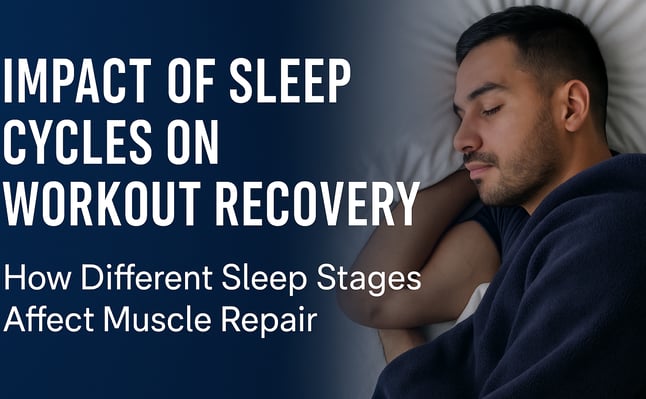How Sleep Cycles Impact Muscle Recovery: The Hidden Key to Better Gains
Struggling with recovery or progress despite solid workouts? Learn how deep and REM sleep directly affect muscle growth, hormone balance, and performance—plus tools to help you optimize rest for real results
5/12/20253 min read


The Impact of Sleep Cycles on Workout Recovery: Why Real Gains Happen in Bed
If you’re hitting the gym hard, eating clean, and still feeling sore, sluggish, or just not progressing—you might be ignoring one of the biggest performance boosters there is: sleep.
Most people treat sleep like a bonus or afterthought. But in reality, it’s one of the most important parts of recovery. Your muscles don’t grow in the gym—they grow at night, while you’re sleeping. And not just any sleep… it’s the quality and structure of your sleep that makes or breaks how well your body repairs itself.
-What Actually Happens When You Sleep
Sleep isn’t just "off mode." It’s an active recovery process with different stages your body moves through each night.
The key players are:
Light sleep: Where you transition into rest
Deep sleep: Where your body does most of its physical repair work
REM sleep: Where your brain resets and locks in motor skills
You cycle through these about 4–6 times per night, and the balance between them matters more than just sleeping 8 hours.
Deep Sleep = Muscle Repair Mode
If you’re training hard, you’re creating micro-tears in your muscles every session. That’s the goal—it’s how growth happens. But if you’re not giving your body time to repair those tears during deep sleep, you’re just stacking damage without letting your system rebuild stronger.
Deep sleep is when growth hormone is released in the highest amounts. This hormone is key for repairing tissue, reducing inflammation, and even boosting fat metabolism. Without enough of this sleep stage, you’re missing the anabolic window your body desperately needs.
If you wake up groggy, feel beat up for days, or can’t seem to recover like you used to—there’s a good chance your deep sleep is falling short.
Fitbit Inspire 3
Amazon Link
Quick, clean sleep tracker that breaks down deep vs REM sleep. Let’s you actually see if you’re recovering or not.
REM Sleep = Sharper Performance
While deep sleep handles the body, REM sleep handles the mind.
This is where you lock in technique, process what you learned, and sharpen your muscle memory. Think of it like uploading your training sessions to your brain so it can store the movement patterns and reactions more efficiently.
REM also boosts focus, coordination, and reaction time. So if you’ve been feeling off, uncoordinated, or just mentally foggy during workouts—it’s probably a REM issue.
And here's the thing: your best REM sleep usually happens toward the end of your sleep window, so sleeping just 5–6 hours chops it short. That’s why those “hustle culture” late nights and early mornings often backfire when it comes to performance.
Bad Sleep Kills Gains
Let’s be real—bad sleep doesn’t just make you tired. It works against everything you’re training for.
When you don’t sleep enough:
Cortisol goes up (slows muscle growth, increases fat storage)
Testosterone drops (reduces strength, recovery, and mood)
You crave more sugar and junk food
Inflammation stays high, which affects your joints and slows healing
A study from BMC Public Health found that people who consistently sleep poorly have higher body fat, less muscle mass, and worse performance across the board—even if they’re working out.
Your diet and training might be locked in—but if your sleep sucks, you’re fighting uphill with the brakes on.
Pure Encapsulations Magnesium
Amazon Link
Helps calm your system and fall into deeper sleep. Glycinate form = easy on the gut and super absorbable.
-How to Get Better Sleep (Simple & Effective)
Fixing your sleep doesn’t have to be complicated. You don’t need red light panels or a $500 mattress topper. You just need to give your body the conditions it wants to sleep well—consistently.
Start with this:
Go to bed and wake up at the same time every day (even weekends)
Avoid screens and bright lights 60 minutes before sleep
Keep your room dark, cool, and quiet
Do some light mobility work, stretching, or journaling before bed to slow down
Don’t eat heavy meals or slam caffeine late in the day
Think of it like pre-workout for your sleep—set the mood, follow the ritual, and let your system reset.
MZOO Sleep Mask
Amazon Link
Full blackout mask that doesn’t press on your eyes. Simple way to block light and stay in deeper sleep longer.
Final Word
If you’ve been training hard but still feel like your results don’t match your effort—it’s time to check your sleep.
Sleep isn’t a side note. It’s a core part of your recovery and growth strategy. When you optimize your sleep cycles—deep and REM—you give your body the chance to perform, rebuild, and show up stronger.
Use the tools. Stick to the habits. And watch your recovery, strength, and focus go way up.
FITNESS
Nutrition
WellnesS
info@movebetterco.com
© 2025. All rights reserved | Privacy Policy | Terms & Conditions